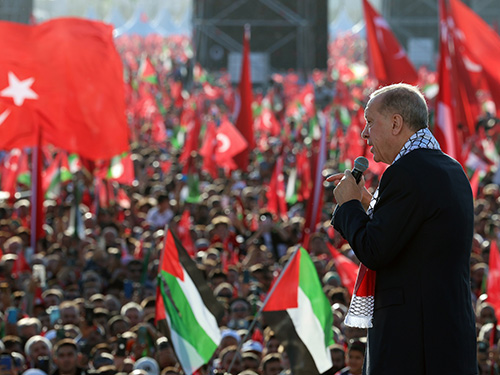Sinem Adar on Turkey’s dilemmas amid the Israel-Gaza war
November 28, 2023
Turkey Book Talk #207 – Sinem Adar, associate at the Centre for Applied Turkey Studies at the German Institute for International and Security Affairs, on Turkey’s response to the Israel-Gaza war.
The conversation builds on her recent article for War on the Rocks arguing that the crisis shows the limits of Turkey’s regional influence. She also co-wrote a piece for the Middle East Institute with Hamidreza Azizi, looking at how Turkey and Iran’s interests converge and diverge on this and other issues.
Download the episode or listen below:
Listen to Turkey Book Talk: iTunes / PodBean / Stitcher / Spotify / Google Podcasts / PlayerFM / Listen Notes
Follow : Instagram / Facebook / Twitter


Become a member on Patreon to support Turkey Book Talk. Members get a 35% discount on all Turkey/Ottoman History books published by IB Tauris/Bloomsbury, transcripts of every interview, transcripts of the whole archive, links to related content upon publication of each episode, and over 200 book reviews covering Turkish and international fiction, history and politics.
Check out and sign up to the excellent Turkey Recap.
Turkish newspapers weigh up the Middle East’s ‘new balances’
November 24, 2012
In the wake of the Nov. 21 ceasefire between Israel and Gaza, there has been much talk of the changing power balances in the Middle East. The leading role played by Egypt and its new president, Mohamed Morsi, in brokering the ceasefire is being interpreted by many as Egypt’s reintroduction as a major regional player. Meanwhile, the crisis was another litmus test for the “rising Turkey” thesis, and Turkey’s apparent marginalization during the process seems to have once again exposed the gap between Foreign Minister Ahmet Davutoğlu’s ambitious rhetoric and the reality. While diplomacy to secure a ceasefire was still ongoing, Tim Arango wrote in The New York Times:
“Turkey’s stature in the Middle East has soared in recent years as it became a vocal defender of Palestinian rights and an outspoken critic of Israel and pursued a foreign policy whose intent was to become a decisive power in regional affairs. But as Gaza and Israel were once again shooting at each other, Turkey found that it had to take a back seat to Egypt on the stage of high diplomacy … Ersin Kalaycioglu, a professor of international politics at Istanbul’s Sabanci University, [says]: ‘Turkey is pretty much left with a position to support what Egypt foresees, but nothing more.’”
In a similar piece, Foreign Policy described “all the hype about Turkey’s aspirations to be a regional power broker” as “overblown”:
“They embraced the principles, themes, and language of anti-Israeli sentiment so common in the Arab world, but without any nuance that would allow them to continue to play in the Arab-Israeli game. The Egyptian, Jordanian, Qatari, and even Saudi governments, for example, have a long history of engaging in very public criticism of Israel, but have always managed to keep lines of communication open to manage regional crises and look out for their interests. Not so the Turks who seemed to relish burning bridges with the Israelis.”
In the Turkish press, Nov. 23’s Taraf weighed up the new regional balances, considering those who gained and those who lost from the conflict. It placed Turkey in the “Loser’s Club,” under a headline saying: “Egypt in, Turkey out”: “The closing of all dialogue channels with Israel has been paid for diplomatically. According to many foreign observers, by only keeping ties with Egypt, Turkey has lost much of its persuasiveness in such issues.”
Perhaps unsurprisingly, other pro-government newspapers remained fairly quiet on the issue. Only Kerim Balcı put a brave face on it in Zaman, arguing that Egypt’s mediator role was more natural in an issue like Israel-Palestine:
“Yes, Turkey should wish to take part in efforts to solve any clashes that occur in the region, and indeed the world. However, in this zeal, other international actors should never be left out of the circuit. On the issue of Hamas, Egypt’s entry to the circuit is not a virtue, it’s a duty.”
These words might be more convincing if Turkey hadn’t already made such a big play of being a potential mediator, particularly in conflicts such as that between the Israelis and the Palestinians.
Conservative Islamist daily Yeni Şafak seems to be offering its readers a comforting fictional parallel universe. Alongside the requisite headline story about Israel’s “eight-day long massacre,” its Nov. 23 front page featured a box titled “Thank you, Turkey,” focusing on some marginal quotes from Hamas leader Khaled Mashal thanking the efforts of Turkish officials. It went further the next day, boldly stating in a similar front page box: “Without Turkey it wouldn’t have happened,” referring to the ceasefire process.
Meanwhile, just a day after being widely praised for his role in the ceasefire, Egyptian President Morsi was being criticized from all sides for his domestic move to assume sweeping new powers, leading to violent clashes in central Cairo. The rapid shift from praise to condemnation was striking. Indeed, while Egypt may – in Foreign Policy’s phrase – have taken over from Turkey as the Middle East’s latest “it” country, it has quickly discovered that this is not an easy role to play.



